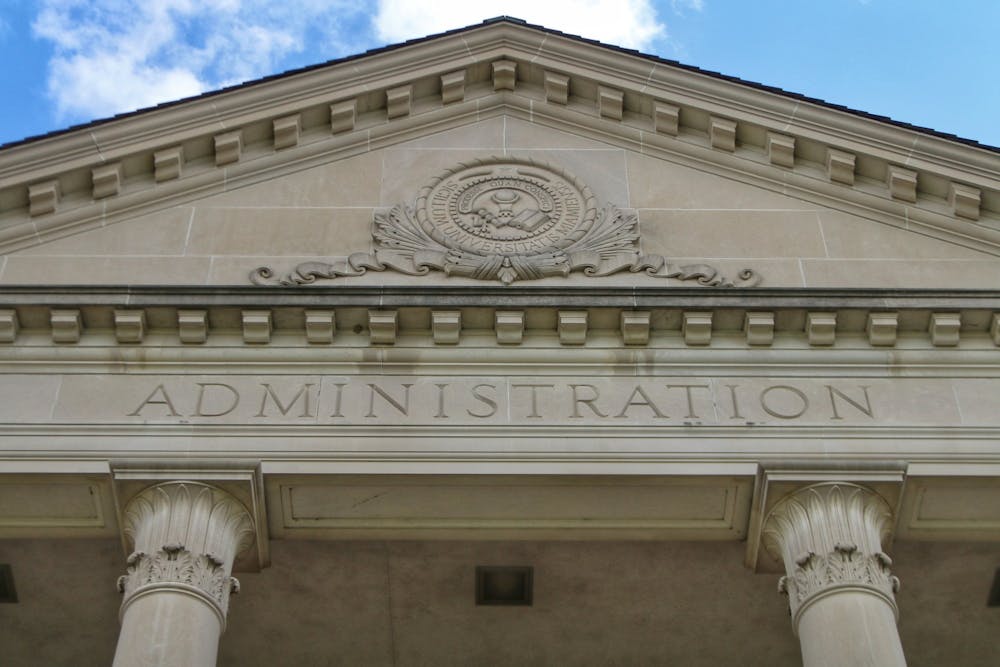Summer scholarships for Miami University graduate assistants are on the line after a proposed reallocation of funds by Provost Jason Osborne. The potential elimination of the scholarship has put graduate assistants on edge.
These cuts, if approved, will begin next year. Current graduate students will receive no reduction in their scholarship this summer.
Currently, to qualify for the summer scholarship, graduate students must hold a graduate assistantship, residence hall personnel assistantship or a dissertation scholarship for at least a full semester.
In addition, graduate students have to complete at least nine credit hours each semester and either make satisfactory progress toward a graduate degree or be certified as engaged in a full-time graduate study by their department to qualify.
Eligible students who have worked two semester appointments are awarded a summer scholarship totaling $1,800.
There have been concerns from administration that the policy is too vague and does not clearly define responsibilities of graduate students during the summer.
Miami’s Graduate Student Association (GSA) formed a task force to advocate for the continuance of the summer scholarship. The graduate representatives presented the task force’s position statement to Graduate Council, a governing body of graduate faculty and students, at its May 12 meeting.
In response to the task force’s proposal, Graduate Council voted unanimously to gather stakeholders to generate ideas for policy revisions, hold open forums to discuss potential revisions to the policy in the summer and fall of this year and actively involve the GSA task force in the revision of the policy. The Miami Student reached out to Rose Marie Ward, the dean of the graduate school, for comment about efforts the grad school has taken to help students, but Ward said she was not available for comment.
Although the proposal was received positively by the council, there are still decisions to be made about graduate student funding. After a revised policy is created, it must be reviewed by Graduate Council, the Council of Academic Deans and then University Senate.
Osborne first suggested reevaluating the scholarship when he began working at Miami in August 2019. He said promising money was not common at other universities. The graduate school has since stopped promising the summer scholarship to prospective students.
“Having been a dean of a graduate school, and looking at typical practices, [offering a summer scholarship] was not, in my understanding, a typical practice,” Osborne said.
“What is typical is that if students are getting supported over the summer, they're usually working on a grant, or they're teaching a course or there’s maybe a small pot of money where they can apply for a competitive research scholarship. But just to promise everyone tuition dollars with no expectation or oversight of any kind, I think is not a good use of money.”
Enjoy what you're reading?
Signup for our newsletter
Graduate students argue, however, that most of their time during the summer is spent doing research or actively working on assignments to help them excel in their degree.
Angela Glotfelter, the leader of the GSA Summer Stipend Task Force, worked to cultivate data about the graduate school to present to Graduate Council.
According to Glotfelter’s data, 63 percent of biology graduate students spend more than 40 hours a week working on research projects during the summer. Seventy-eight percent of English graduate students have summer responsibilities directly related to their degree.
“Summer is when we don't have to teach,” fifth-year Cellular, Molecular, and Structural Biology doctorate student Stephanie Padula said. “So that's when we really get to focus full time on our degree and our program … it's not summer for us like it is for the undergrads where you can go home. It’s absolutely necessary for us to do that work.”
The yearly stipends graduate students on assistantships receive within their nine-month contract is proprietary, meaning it's based on the funds of their specific department per year.
Graduate students in the biology department have been vocal against the proposed cut of summer scholarships on social media. They feel the cut could negatively impact the graduate school and make it harder to recruit students.
Fifth-year Ecology, Evolution and Environmental Biology (EEEB) doctorate student Miranda Strasburg said those with graduate assistantships in the biology department make about $21,000 a year before taxes. She said the biology department houses some of the highest-paid graduate students at Miami.
The elimination of the summer scholarship would result in a pay cut of almost nine percent for graduate students in the biology department.
Students like fourth-year EEEB doctorate student Courtney Dvorsky use the summer scholarship to help pay for major expenses during the summer. Without it, she fears the yearly stipend won’t be enough to sustain graduate students during their summer research.
“I really use the summer scholarship to pay my rent and other bills over the summer to get through,” Dvorsky said. “Without the summer scholarship, I think a lot of graduate students are either going to have to start applying for student loans or going to be somewhat in trouble of paying bills, and they won't be able to save anything hardly at all.”
Graduate students are also responsible for paying for their own health insurance despite being employed by the university. Gloefelter said 77 percent of biology graduate students are paying, on average, about $1,722 a year for health insurance, which is about eight percent of their income. She said students in the English department pay the same for insurance.
In the 2019-2020 academic year, English graduate students paid an average of just over $1,213.26 in general fees. When combining the average health insurance costs with the cost of general fees, graduate students are paying about $2,850 per year out of pocket to cover these expenses.
The biology department put out a survey in which 17 people from schools with research activity comparable to Miami replied. Nine of those individuals said their health insurance was paid for by their university. The schools who responded to the survey included Baylor University, Saint Louis University and Northern Illinois University.
“Graduate students are not given health insurance,” Strausburg said. “So if you don't have health insurance through your parents, you have to pay for that out of pocket, and it's about $1,800. So essentially, we're $1,800 dollars for health insurance where many universities give their graduate students health insurance, and they're taking $1,800 away from us when they remove the summer scholarship.”
In addition to these costs, graduate students on full assistantship duties are not allowed to have another job at the university unless approved by the dean of the graduate school.
“If you [are] on our payroll as a graduate assistant, we do request that you get permission because we want to make sure that graduate students aren't taking on so many other obligations that it's going to interfere with what we're paying [them] to do or progress toward [their] degree.” Osborne said. “If you're not under contract as an assistant, you can go do whatever you want.”
Strasburg said with her wages, it took years to save up for a decent mode of transportation.
“Last summer, I spent $5,000 on [a] car,” Strasburg said. “I spent four years saving up money to buy a $5,000, 13-year-old car. It's not like I'm going out on these vacations and doing anything.”
These students say they enjoy their time at Miami, but these cuts make them feel undervalued.
“We have bachelor's degrees, some of us have master's degrees, we're highly skilled and we get paid nothing,” Padula said. “It just really hurts us. To be in the situation where I've gotten more into my degree, I've gotten more skills, I've put more effort into everything, and my reward is to get pay cut after pay cut … it's just like, ‘OK, well, do they care about us? Do they?’ They say that they do. But their actions don't always reflect that.”
Fourth-year EEED doctorate student Rachel Pilla echoed Padula’s sentiment.
“This potential cut [adds to the] feeling [of being] undervalued for the amount of time and energy and effort we put into so many things that are important to us,” Pilla said. “Just constantly feeling like we're sort of the lowest group on the totem pole in so many different ways.”
Padula said she’s heard about the pay cuts President Crawford and other upper-level administration have taken to help students but has not heard anything about the money benefitting graduate students.
“There's a difference between them sacrificing when they make a lot of money,” Padula said, “and us sacrificing when we barely make enough as it is.”




